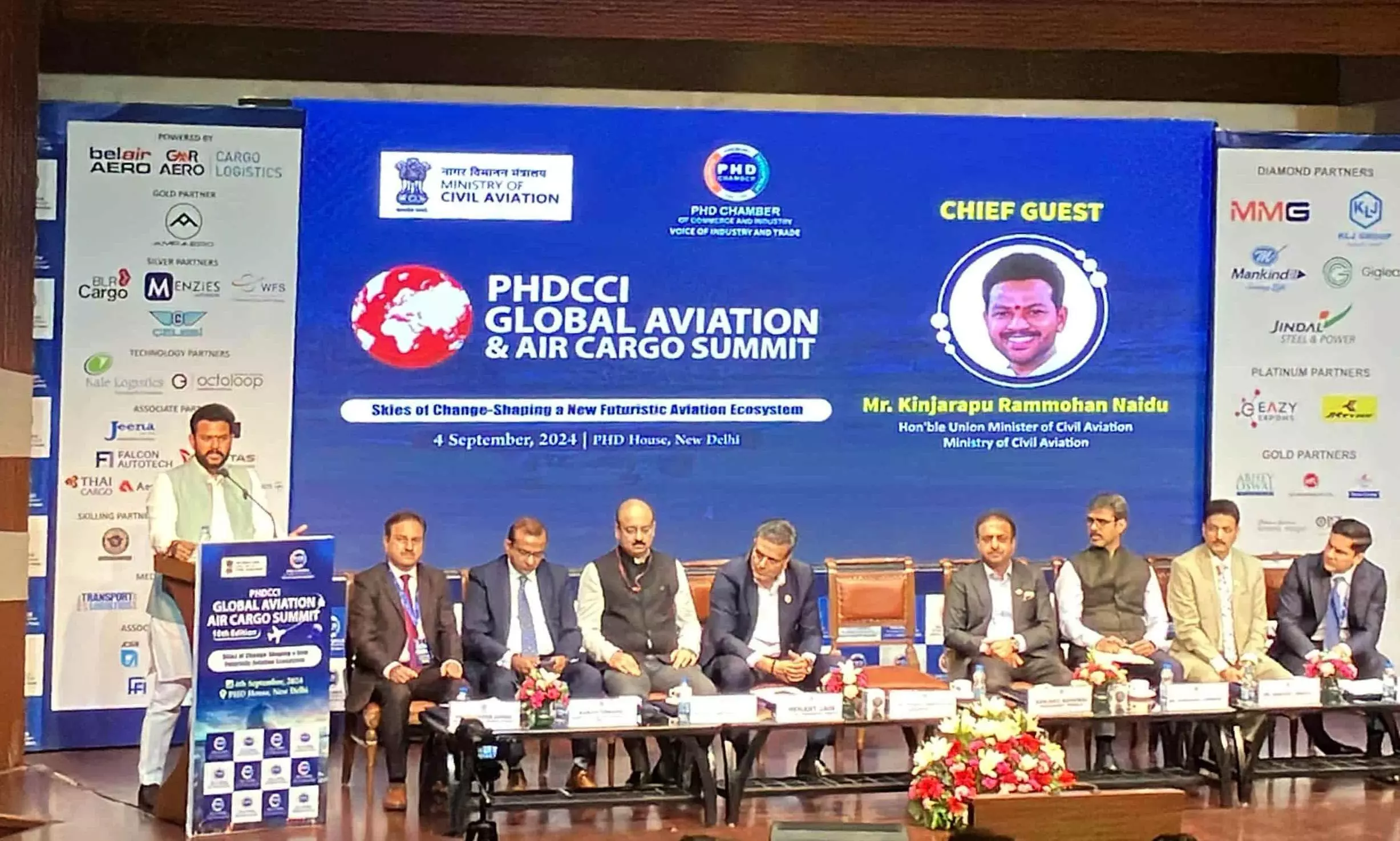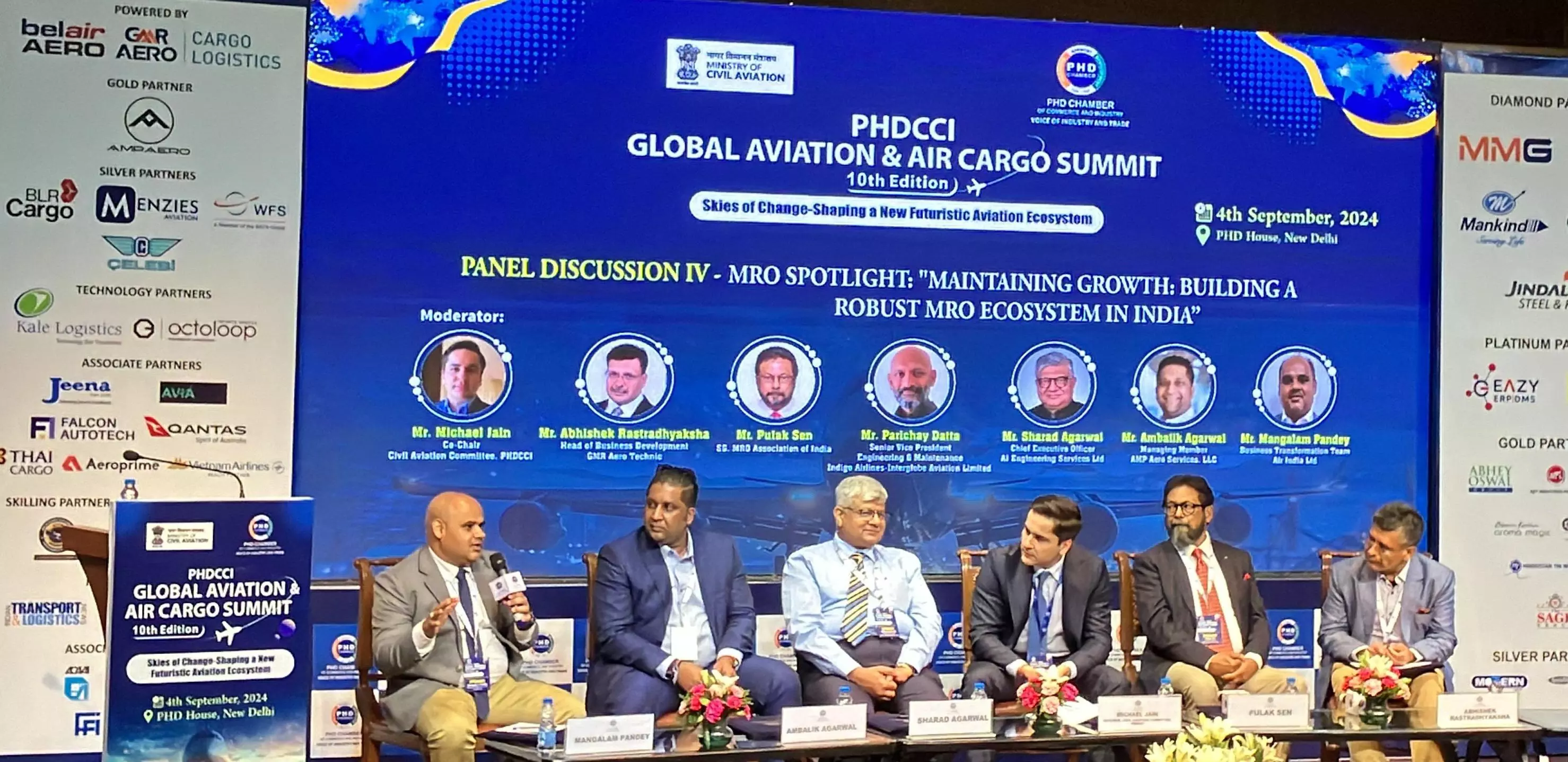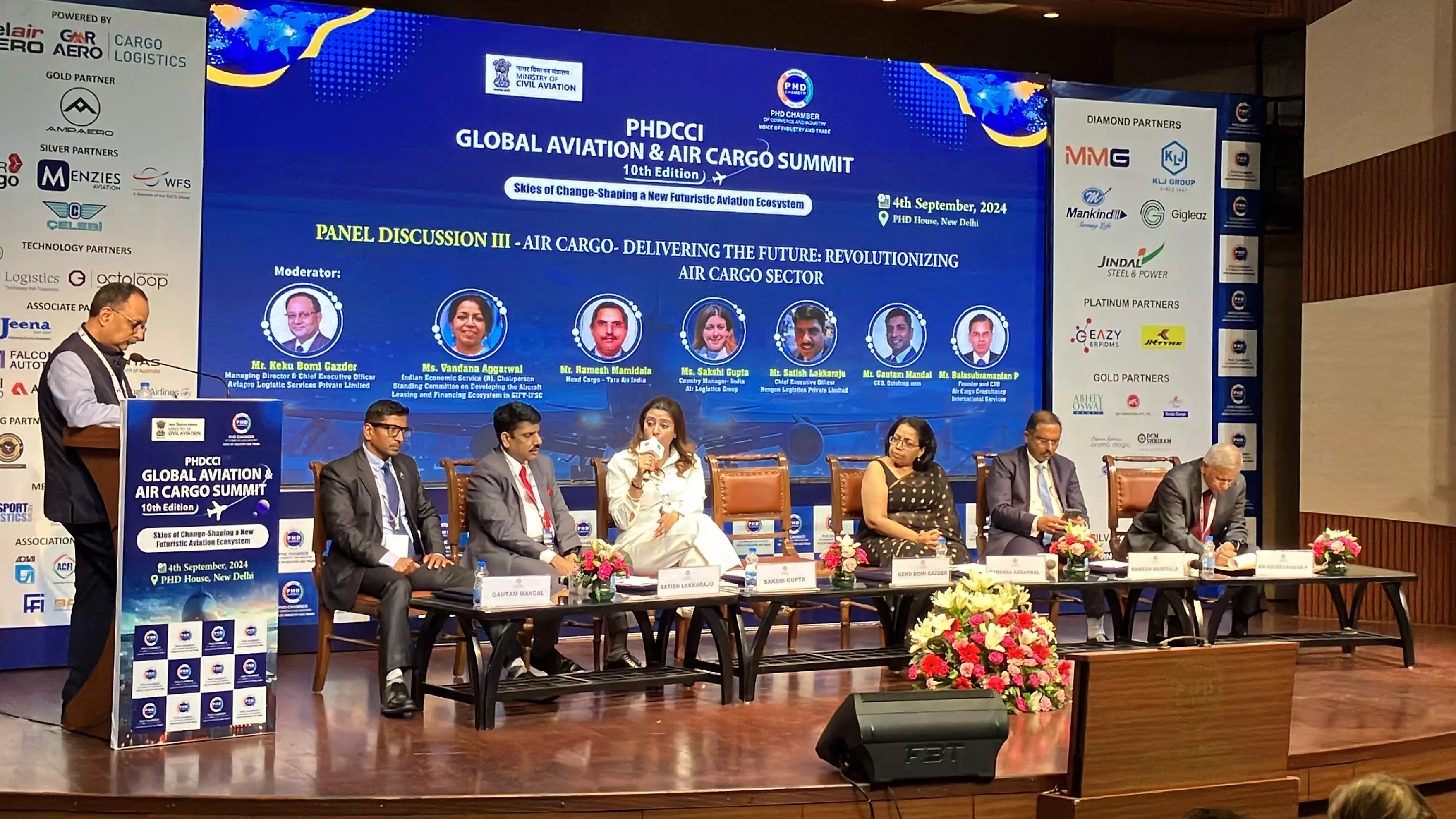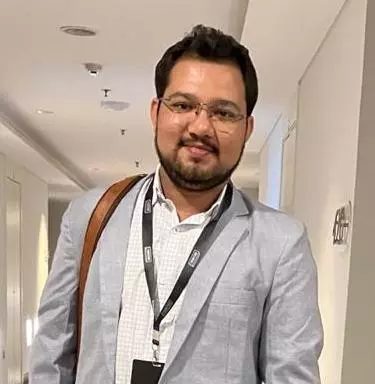India to export homegrown aircraft, says Civil Aviation Minister
India aims to become a global aircraft exporter, scaling up domestic manufacturing, says Civil Aviation Minister.

"We want to manufacture aircraft in India on a large scale, not just to meet domestic demand but to become an exporter of aircraft," announced India's Civil Aviation Minister, Kinjarapu Ram Mohan Naidu, at a press meet after his inaugural session at the 10th edition of PHDCCI Aviation & Air Cargo Summit 2024, held in New Delhi on September 4, 2024. His statement marked a pivotal moment in the country's aviation ambitions, laying out a bold vision for India to become a global leader in aircraft manufacturing and exporting.
With Hindustan Aeronautics Limited (HAL) already producing a 19-seater aircraft, the government's focus is now on significantly scaling up the industry. "We aim to develop a complete ecosystem where India can design, manufacture, and export its own aircraft," Naidu emphasised. This ambitious goal is set against the backdrop of India's rapidly growing aviation sector, with plans to nurture the entire manufacturing framework over the next five years.
Scaling up aircraft manufacturing
The government's goal to build a comprehensive ecosystem for aircraft manufacturing is in line with India's broader economic strategy of self-reliance, or "Atmanirbhar Bharat." Currently, India is a major importer of aircraft, but Naidu's speech signals a shift towards reducing this dependence on foreign manufacturers.
India's aviation sector has been experiencing rapid growth in recent years. The increase in demand for domestic air travel, coupled with a burgeoning cargo industry, has created the perfect environment for the government to make this strategic push. As more people take to the skies within the country, Naidu's vision of establishing a robust, indigenous manufacturing sector will be essential to meet both local needs and international opportunities.
HAL, a public sector enterprise with a rich history of manufacturing military and civilian aircraft, is expected to play a central role in this transformation. The 19-seater aircraft is only the beginning of HAL's efforts to diversify its portfolio and expand into larger aircraft models that can compete on the global stage. However, Naidu acknowledged the challenges that lie ahead, noting that while India is developing the expertise to design and manufacture aircraft, the country may still need to collaborate with international players for specific components and technology in the short term.
"In the meantime, if we see a shortage of a component or an engine, we can take help from the existing players," Naidu said, underscoring a pragmatic approach that blends indigenous efforts with strategic global partnerships. Over time, India aims to close these gaps and develop the capability to manufacture everything domestically.
India's growing role in the global aviation industry
India's ambitions in aircraft manufacturing are part of a larger effort to secure a more prominent role in the global aviation industry. As one of the fastest-growing aviation markets, the country is increasingly seen as a key player in shaping the future of the industry.
In the inaugural speech, the minister mentioned that in 2014, India had 74 operational airports. That number has since more than doubled, with over 157 airports now functional across the country. The government plans to continue this expansion, boosting connectivity and further integrating the country's vast regions into the global aviation network. This infrastructure development is crucial as India ramps up aircraft production, ensuring that the necessary facilities and logistics are in place to support increased manufacturing capacity.
Naidu emphasised that India's geographical location offers significant advantages for establishing itself as a hub for aircraft production and export. Situated between the major aviation markets of Europe and Asia, India has the potential to act as a key player in global supply chains, especially as the world's focus shifts towards newer markets.
Air India's role in boosting aircraft manufacturing
In parallel with these developments, Air India, which was privatised nearly two and a half years ago, has also been instrumental in reshaping India's aviation landscape. As part of its transformation, Air India has taken steps to bring back Original Equipment Manufacturers (OEMs) to India, enabling them to better understand the country's needs and business environment, informed Mangalam Pandey, Business Transformation Lead, Air India.

"Air India took the liberty and pain to bring all the OEMs back to India so that they could understand the business and challenges, and then finally build the solutions in India," Pandey said at the summit. This move aligns with the broader vision of making India a hub for aircraft production as local manufacturers begin to work alongside global giants," said Pandey.
Air India's initiatives are not only improving the airline's operations but also providing invaluable insights into the development of an ecosystem that supports aircraft manufacturing in the country.
Sustainability and the path to net-zero
In addition to aircraft manufacturing, sustainability emerged as a critical topic at the summit. Kamal Hingorani, Chief Customer Officer at SpiceJet and Chief Officer at SpiceXpress, discussed the role of the aviation sector in combating climate change, pointing out that while aviation accounts for a relatively small percentage of global carbon emissions, it is a highly visible industry. As such, airlines around the world have agreed to ambitious targets, aiming to reach net-zero emissions by 2050.
A key component in achieving these targets is the use of Sustainable Aviation Fuel (SAF). However, Hingorani pointed out that SAF is currently 2.5 times more expensive than traditional Aviation Turbine Fuel (ATF), making it difficult for airlines to adopt it at scale without strong government mandates or significant price reductions. He also mentioned the Indian government's plans to introduce SAF blending mandates of 1% by 2027, 2% by 2028, and 5% by 2035.
While referring to the minister's statement about India aiming to make indigenous planes in India, Hingorani also expressed optimism about India's potential to develop hydrogen-powered aircraft in the future. "If we can start, have from scratch a hydrogen aircraft, because we have the capability, competence, intelligence, and the intellect, I think that will be an absolutely revolutionary change," he stated.
In a panel discussion, Manish Agnihotri, CEO of Worldwide Flight Services (WFS), emphasised the need for a more coordinated approach to sustainability in the aviation industry. He pointed out that while airports and various ecosystem players have taken some sustainability initiatives, there is a lack of a structured and common approach. He highlighted the importance of harmonising policies and called for a multifaceted approach in the Indian aviation sector. Agnihotri suggested measures such as mandating the use of sustainable aviation fuel by the Ministry of Civil Aviation and powering ground support equipment with renewable energy. He also advocated for a shift towards paperless operations.
Advancing air cargo and logistics
While aircraft manufacturing and sustainability were central to the discussions at the summit, India's air cargo industry is also undergoing a significant transformation. Naidu highlighted the rapid growth in the sector, noting that cargo handled in India has increased from 2.47 million tonnes in 2020-21 to an expected 3.36 million tonnes in 2023-24. He stressed that India is positioning itself to become a global air cargo hub by improving connectivity, reducing turnaround times, and investing in modern cargo terminals.
AAI Cargo Logistics and Allied Services (AAICLAS), a subsidiary of the Airports Authority of India (AAI), has played a key role in this transformation. AAICLAS manages both international and domestic cargo terminals across India and is spearheading efforts to digitise and modernise the country's air cargo infrastructure. Naidu emphasised the importance of integrating cutting-edge technologies to enhance the efficiency of cargo operations.
Suneet Gupta, Senior Vice President at Kale Logistics, who has been tasked with digitising the cargo operations of the upcoming Noida International Airport. Gupta mentioned that Noida International Airport had envisioned a completely paperless operation from the start. The goal is to build a community of buyers and sellers in the logistics sector to optimise available capacity. Additionally, Noida International Airport has committed to integrating all its systems through a single partner. This means that from the moment a truck enters the parking slot until it reaches the terminal for unloading, it will go through interconnected systems, ensuring a seamless flow of data.
Ramesh Mamidala, Air India's Head of Cargo, highlighted the growing importance of Indian airports as major transhipment hubs. He also emphasised that for an airline to generate significant revenue from cargo, it must handle long-haul shipments and utilise a large airport as a hub.
Diversifying human pillars of logistics
India's aviation sector is poised for a major transformation, with ambitions extending beyond just meeting domestic demand. In addition to the focus on manufacturing and sustainability, the summit also highlighted the importance of diversity in the aviation and logistics sectors. Sakshi Gupta, Country Manager-India at Air Logistics Group, shared valuable insights on the role of women in the industry. She emphasised that fostering gender diversity can strengthen human resource capital and drive innovation. "If we collectively embrace a fusion of men and women, all companies will thrive," Gupta noted, advocating for an unbiased, talent-focused approach to recruitment.

Her remarks underscored the need for greater inclusivity and highlighted how diversity can contribute to the overall growth and modernisation of India's aviation ecosystem, aligning with the sector's broader ambitions.
- Indian aircraftIndian airportIndian airportsIndian airlinesIndian Civil Aviation MinisterIndia to export aircraftIndia to manufacture exportaircrafts made in IndiaCivil Aviation MinisterKinjarapu Ram Mohan NaiduPHDCCI Aviation and Air Cargo SummitAir cargoMROaircraft maintenance repair and operationsaeroplane maintenanceDelhi events 2024PHD eventsaviationair cargologistics

Rajarshi Chatterjee
Rajarshi is an editorial professional with nearly a decade of experience in writing content for print and online publications. He has hosted numerous entrepreneurship events and moderated sessions at various events, including Flower Logistics Africa. He has previously worked with reputable organizations such as YourStory, YouGov, Inc42, and Sportskeeda and has catered to a diverse range of clients, including Google, PhonePe, the Karnataka State Government, and the Rajasthan State Government. In addition to writing, he enjoys watching films, cooking, and exploring offbeat locations in India.


